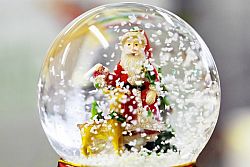

Being mindful on waste is important and Christmas generates a lot of excess waste from all aspects of the festivities, but what specifically is creating that waste and how can we make Christmas a more eco-friendly event?
Food
Overeating can be classed as a tradition at Christmas, eating and drinking in excess, mince pies, alcohol and turkeys. ChangeWorks confirmed that during the Christmas season, as a nation, we eat 80% more food than during the rest of the year.
The downside to this is that we are producing excess waste and pollution to the point where we are disposing 230,000 tonnes of food during the Christmas period. The University of Manchester calculated that our combined Christmas dinners produce the same carbon footprint as a single car travelling 6,000 times around the world.
Wrapping paper
In 2016 we threw away 227,000 miles of wrapping paper and if we placed all our Christmas cards alongside one another, they would stretch around the world 500 times. We also get through 4,500 tonnes of tin foil and 125,000 tonnes of plastic packaging during Christmas.
Greenpeace found that as little as one kilogram of wrapping paper emits three and a half kilograms of CO2 during the production process. This takes around one and a half kilograms of coal to power its production, not taking into account further packaging and transportation.
Trees
The yearly debate over fake or real Christmas tree continues with both decisions having consequences for the environment. Each year we buy around eight million real trees, with over five million opting for artificial trees.
Artificial trees have a carbon footprint equivalent to around 40kg of greenhouse gas emissions, with the main material of the tree being plastic. As an artificial tree is non-biodegradable, they are sent to landfill or incinerated, having a terrible impact on the environment. Nevertheless, artificial trees can be reused for years, so can stop the need for buying a new tree. You could also buy a second-hand artificial tree.
Real Christmas trees are grown over a period of seven to ten years and are biodegradable. They have a lower carbon footprint due to shorter travel and also help protect and stabilise the soil. However Friends of the Earth advise looking for a tree that is locally produced or grown in the UK, with an FSC certification. To avoid trees being dumped after Christmas, it is recommended to find a collection service where they are shredded and used on gardens and parks.
Eco-friendly changes
You can still celebrate Christmas and be eco-friendly, and despite COVID-19 changing Christmas festivities for most, there is still changes that can be made to reduce waste and environmental impact at Christmas.
Rechargeable batteries
Electronic toys and devices make great presents, but they require disposable batteries. On average we buy ten batteries per year for gadgets and toys. In 2009 only two out of every ten batteries went to recycling plants.
In 2015 the UK recycled 36% of all batteries and 83% of lead-acid batteries. You can now recycle used batteries in shops around the UK, as stores selling more than 32kg of batteries a day must provide in-store recycling bins.
By switching to rechargeable batteries, not only can they be reused up to 1500 times which helps the environment, they are also a cheaper option for powering toys and devices.
Sustainable decorations
Christmas tree lights tend to be switched on for an average of ten hours a day, which if they are incandescent bulbs, can produce a lot of CO2. However you can still enjoy eco-friendly Christmas tree lights by switching to LED lights. Old incandescent bulbs can use up to 80% more wattage and use up to 90 times more power than LED bulbs.
You can also create your own sustainable Christmas decorations with sticks, paper and ribbon.
Food leftovers
As we always overbuy Christmas food, you can be more environmentally friendly by not throwing away leftovers. Freezing the leftovers will save money and means the Christmas food can last a little longer.
You can also explore recipes for leftover meats and vegetables, make up meals and freeze them for when needed.
Eco-friendly Christmas cards and gifts
By buying fully recyclable cards from independent brands or charity companies we are able to be environmentally friendly and also support small businesses and charities.
As Christmas presents are wrapped in paper, then in further plastic packaging, it would help to buy eco-friendly Christmas gifts too. This could include:
There are definitely changes we can all adopt to make the festive season a bit more environmentally friendly, and as always Cedrec would like to wish you an eco-friendly Christmas!